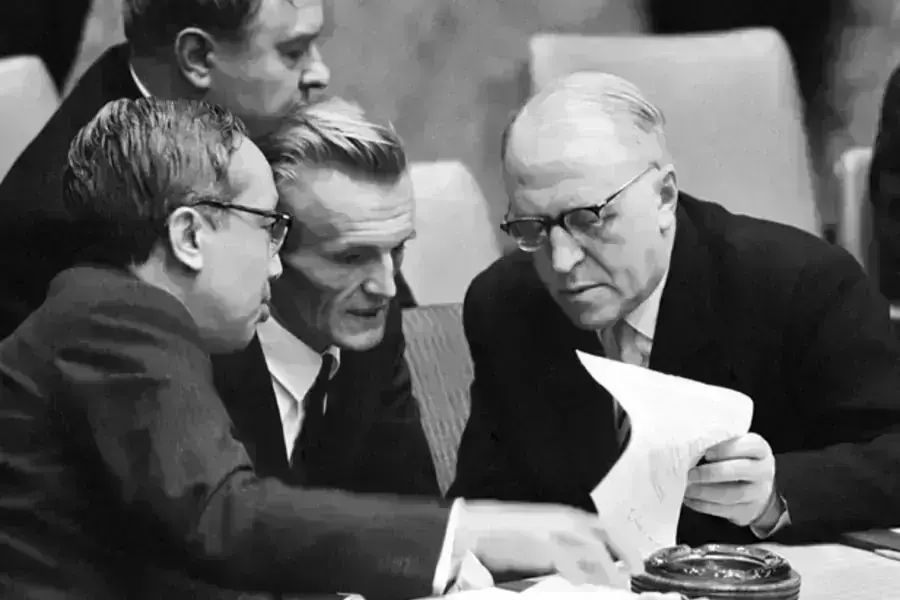TWE Remembers: Eyeball to Eyeball and the Other Fellow Just Blinked (Cuban Missile Crisis, Day Nine)

President John F. Kennedy was beginning to feel the pressure on Wednesday, October 24, 1962, the ninth day of the Cuban missile crisis. The naval quarantine of Cuba had formally gone into effect early that morning. Now there was nothing to do but wait for the Soviets to respond. Kennedy didn’t know whether at the day’s end he would be breathing a sigh of relief or on the road to a nuclear war.
The U.S. Navy initially proposed to intercept Soviet ships when they came within eight hundred miles of Cuba. That distance had been chosen in good part to keep U.S. warships beyond the reach of Soviet fighter planes. But at the suggestion of the British ambassador, JFK had ordered the quarantine line to be reduced to five hundred miles. That would give the Soviets more time to ponder their options, and hopefully, reverse course.
More on:
But moving the quarantine line only delayed the inevitable. The U.S. Navy expected that the first Soviet ships would cross the quarantine line late in the morning of October 24. As JFK prepared to attend the 10:00 a.m. ExCom meeting, he lamented to his brother, Attorney General Robert Kennedy, that he had been forced to impose the quarantine. “I just don’t think there was any choice,” RFK assured him, “and not only that, if you hadn’t acted, you would have been impeached.” JFK’s response was succinct: “That’s what I think—I would have been impeached.”
The morning’s ExCom meeting began with an intelligence briefing, followed by Secretary of Defense Robert McNamara sharing photos showing that the Air Force had responded to the president’s directive that U.S. planes in the southeastern United States be dispersed. At 10:25 a.m. a staffer delivered a note to CIA director John McCone. The note contained the message that Kennedy and his advisers had been hoping for: Soviet ships had stopped dead in the water. Unbeknownst to the group at the time, shortly after Kennedy’s nationwide television address Soviet leader Nikita Khrushchev had ordered Soviet ships outside the quarantine line to turn around. “We’re eyeball to eyeball,” Secretary of State Dean Rusk whispered to National Security Adviser McGeorge Bundy, “and I think the other fellow just blinked.”
Rusk’s comment became the iconic line of the Cuban missile crisis. But it was misleading in a critical way. It implied that U.S. and Soviet ships were in close proximity if not actually steaming straight for each other. The men gathered around JFK on the morning of October 24 certainly thought that was the case; McCone even recorded a note later in the day that a U.S. Navy vessel had confronted a Soviet ship at virtually the same time he received the intelligence bulletin in the White House. The incident didn’t take place. In fact, the two closest Soviet ships were more than five hundred nautical miles from the quarantine line and headed back to the Soviet Union.
Rusk’s dramatic interjection also suggested that the crisis had peaked. It hadn’t. That night, Kennedy received a letter from Khrushchev. Even though the Soviet leader had privately ordered Soviet ships to return home, he told Kennedy the exact opposite. He rejected the American “ultimatum” and insisted that the Soviet Union would not respect the quarantine:
Mr. President, if you coolly weigh the situation which has developed, not giving way to passions, you will understand that the Soviet Union cannot fail to reject the arbitrary demands of the United States. When you confront us with such conditions, try to put yourself in our place and consider how the United States would react to these conditions. I do not doubt that if someone attempted to dictate similar conditions to you—the United States—you would reject such an attempt. And we also say—no.
The Soviet Government considers that the violation of the freedom to use international waters and international air space is an act of aggression which pushes mankind toward the abyss of a world nuclear-missile war. Therefore, the Soviet Government cannot instruct the captains of Soviet vessels bound for Cuba to observe the orders of American naval forces blockading that Island. Our instructions to Soviet mariners are to observe strictly the universally accepted norms of navigation in international waters and not to retreat one step from them. And if the American side violates these rules, it must realize what responsibility will rest upon it in that case.
Khrushchev looked to have thrown down the gauntlet. Kennedy would have to decide how to respond. The elation of the morning’s news had given way to new fears. The Cuban missile crisis was not only far from over, its most dangerous days still lay ahead.
More on:
For other posts in this series or more information on the Cuban missile crisis, click here.
 Online Store
Online Store